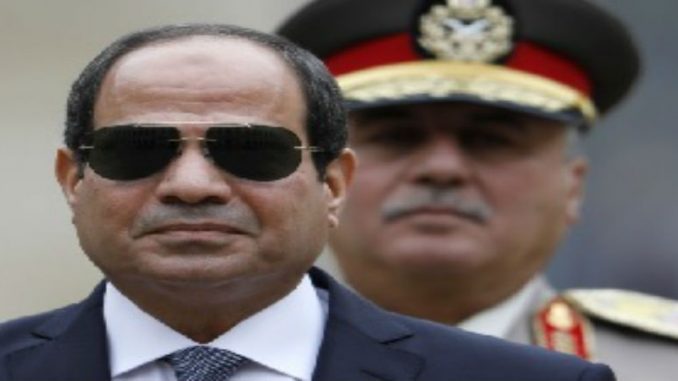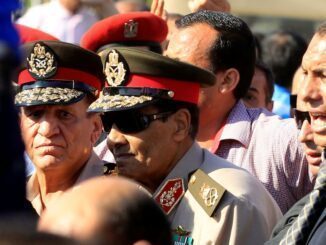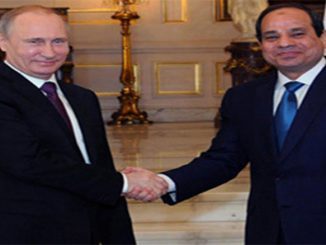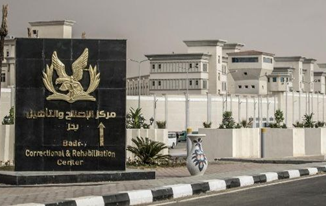
Egypt’s leader silences the West by claiming to fight terrorism while at home his economy collapses, civil society grows atomised and violence is starting to spread
Egypt’s decision to host its first international weapons fair, which opened earlier this month, was a calculated move. The three-day event represented an attempt by the government to project security and stability to the world after years of turmoil.
In his opening address to companies from the US, the UK, France and others, Egyptian defence minister General Mohammed Zaki said as much, calling defence “a pillar of peace”. And it has been suggested that, following the mass show trials and death sentences of September, it’s business as usual in Abdel Fattah al-Sisi’s Egypt.
The stories coming out of Egypt are every bit as harrowing, and every bit as disgraceful, as the account of Jamal Khashoggi’s murder and dismemberment in Istanbul. As far back as 2017, Human Rights Watch described a “torture epidemic”, involving beatings, electric shocks and sometimes rape. Giulio Regeni, the Italian student found dead in Cairo days after the fifth anniversary of 2011 revolution, was beaten, burned and tortured for days. His mutilated body was discarded in a ditch; still, the Egyptian authorities refuse to accept the Italian record of suspects.
Since late October, dozens of human rights activists have been arrested, including 19 on a single day in November. As for victims of sexual harassment such as Amal Fathy, they are arrested and imprisoned simply for speaking out in a country where sexual violence is rife.
Few escape Sisi’s clutches; an Egyptian judiciary system turned rotten to the core has given thousands of imprisonment and execution orders since the former general’s ascension to power. All political colours are now represented in Egypt’s overcrowded and filthy jails, where medical treatment is frequently refused. The Swiss human rights organisation Alkarama reported that, between 2013 and September 2015, 323 people died in Egyptian prisons; more recent data is hard to come by, but conditions have almost certainly worsened in the years since.
Even prominent figures, such as the former parliamentarian and writer Mostafa al-Naggar, have become invisible and are assumed by many to have been “disappeared” – despite strenuous denials and claims to the contrary from the Egyptian state. Former minister of justice Ahmed Solaiman has recently been arrested for criticising the regime’s violation for human rights and the biasness of judiciary system. In the eyes of Sisi, anyone who took part, directly or indirectly, in the uprising of 2011 is an enemy of the state, and he has no qualms in telling the foreign media that those imprisoned for political beliefs are criminals.
In spite of all this, the West has gone quiet. General Sisi, like the others leaders in the quartet of vile Arab dictatorships allied with the United States, now understands how to silence the West: brazenly putting forward the narrative that he is “fighting terrorism” and bringing stability to the region, he has found a friend in Donald Trump, whose naiveté and changeability have already been exploited by the world’s most unpleasant leaders including Vladimir Putin. All the while, the economy continues its collapse into inertia, civil society grows atomised, isolated and alienated, and a future of widespread violence looks increasingly likely.
To date, not a single police officer has been held accountable for the beatings and killings since 2011. No one has ever been taken to task for the deaths of more than 1,000 people during the Cairo protests in 2013. The Western powers continue to look away – or, in the case of Donald Trump, even praise –the violent methods employed by Sisi to consolidate power under the guise of counter-terrorism. Even Italy, which reacted strongly to Regeni’s killing in 2016, sent a new ambassador to Cairo a year later in an effort to normalise relations between the two nations.
But the West should know that conditions in Egypt, which are now worse than ever, will not improve by themselves. Without action, they will continue to worsen. And, like the leaders of the other Arab dictatorships, Sisi will continue his assault on freedom of speech and freedom of expression, and continue to interpret the silence of the West as tacit acceptance that he can do as he pleases.
A concerted effort is required to stop stop Sisi’s flagrant violation of human rights, his continued attacks on democracy and targeted silencing of all political rivals. Only then will we be able to start to restore security and stability to the region.
By: Yehia Hamed – Mr. Hamed was Egypt’s investment minister in 2013. He now focuses on investments in emerging markets and runs the Global South Forum for International and Economic Dialogue.



